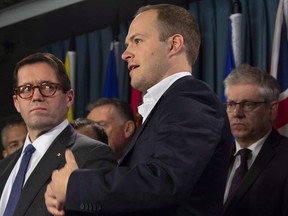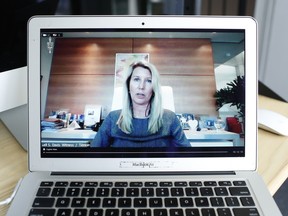How the COVID ‘hero pay’ scandal prompted Ottawa to make wage-fixing illegal

Wage-fixing and no-poach agreements will be criminalized in Canada starting June 2023

Article content
Nathaniel Erskine-Smith, a Liberal MP from Toronto, woke up on his birthday in 2020 and wrote out an email on his phone.
Advertisement 2
Story continues below
Article content
Two days earlier, on June 13, 2020, Canada’s top three grocery chains simultaneously cancelled their $2-per-hour “hero pay” bonuses for front-line workers — the store clerks and warehouse staff who continued showing up to keep supermarkets running despite lockdowns, uncertainty, and widespread absenteeism in the first few months of the COVID-19 pandemic.
“It was just outrageous, I think, on a basic level,” Erskine-Smith said. “I was just mad.”
So he wrote the email, at 8:59 a.m., with the subject line: “I’m giving notice of this motion today.”
That email appears to have set off a chain reaction that lasted for two years, culminating last week in a significant change to the way Canada protects workers from wage suppression.
Advertisement 3
Story continues below
Article content
On June 15, 2020, Erskine-Smith’s motion asked the House of Commons industry committee to summon grocery executives to explain why they cut the bonuses and “how those decisions are consistent with competition laws.”

Within weeks, top executives from each of the three chains — Loblaw Companies Ltd., Sobeys parent Empire Co. Ltd., and Metro Inc. — appeared before the committee, where they revealed they had been in contact with one another before cancelling the hero bonuses.
Loblaw president Sarah Davis said she sent a “courtesy email” to let competitors know about her decision ahead of time. Metro CEO Eric La Flèche said he called executives at competing chains trying to get information about when they planned on cutting the bonuses. All three companies stressed that they made their decisions on hero pay independently, and denied any wrongdoing.
Advertisement 4
Story continues below
Article content
“Business is booming,” Erskine said at the hearing. “Profits are coming in in record numbers and, Mr. La Flèche, you are proactively reaching out to your competitors to say, ‘When can we cut pandemic wages?’”
“With all due respect, again I disagree with that,” La Flèche responded.
“I’ll leave the remainder of those kinds of questions to the Competition Bureau,” Erskine-Smith said.

But the Competition Bureau — the agency that enforces competition law in Canada — didn’t investigate. In a letter to Erskine-Smith in 2020, Competition Commissioner Matthew Boswell explained that the Competition Act did not consider it to be a criminal offence when employers collude to fix wages or agree not to hire each other’s staff — known as “no-poach agreements.”
Advertisement 5
Story continues below
Article content
That’s because, at least in the eyes of the law at the time, collusion between businesses to lower the cost of inputs isn’t always a bad thing for consumers. If, for example, independents pool their resources to get a deal on ingredients, then their customers potentially benefit from lower retail prices.
The bureau was still able to go after wage-fixing in civil cases, but first it had to prove that the behaviour hurt competition. Proving that, Boswell argued, “is not a low threshold.” In response, the House of Commons industry committee in 2021 asked the government to tack wage-fixing and no-poach agreements onto the list of criminal offences.
This month, the federal government complied. The Liberals tucked a series of Competition Act amendments into its spring budget bill. And that bill received royal assent on June 23, including a change that will criminalize wage-fixing and no-poach agreements. That amendment comes into effect in June, 2023.
Advertisement 6
Story continues below
Article content
Michael Kilby, a competition lawyer in Toronto, said the new rules will seriously change the way he advises employers on labour issues. Before, he would have told clients that the bureau can only pursue wage-fixing in civil cases, and even then “there’s no real track record of them doing so and there are no real penalties associated with them doing that.” Now, he said, employers convicted of wage-fixing or no-poach agreements could face unlimited fines, jail time, and class action lawsuits.
“This isn’t a little stick, or a slap on the wrist,” said Kilby, who heads the competition and foreign investment group at Stikeman Elliott LLP. “In the worst case, this is huge liability.”
This isn’t a little stick, or a slap on the wrist. In the worst case, this is huge liability
Michael Kilby
Kilby said he expects the ban on wage-fixing and no-poach agreements will also apply to franchisees operating under the same brand. Those franchises can sometimes be subject to rules that forbid them from stealing each other’s staff. For example, Tim Hortons used to include a no-poach clause in its standard franchise agreements. The coffee chain, however, says it stopped using the clause in 2018 and doesn’t enforce it in older agreements.
Advertisement 7
Story continues below
Article content
The Canadian Chamber of Commerce lobbied against the criminalization of no-poach agreements, arguing that franchisees can spend more money on employee training if they don’t have to worry about losing those employees to fellow restaurant owners.
“At the end of the day, they’re a business. So they have to decide, where do they invest their dollars?” said Mark Agnew, the chamber’s senior vice-president of policy and government relations. “If there’s a risk that the folks that they’re hiring could be poached, then that is a disincentive for them to say, I’m going to invest this into my employee training.”
But Vass Bednar, an outspoken advocate for competition reform in Canada, said the franchise model shouldn’t mean “you can have your cake and eat it too.”
Advertisement 8
Story continues below
Article content
-

Tim Hortons, hero pay and the long battle against wage suppression in Canada
-

Corporate pushback is building against Trudeau’s plan for tougher competition law
-

Competition watchdog calls for ‘vigorous enforcement’ to combat rising prices
-

Trudeau planning changes to Canada’s competition laws
“You can pretend you’re an independent business operator, you can buy into this model, and we’re going to make sure that we’ll collude to suppress the wages of your workers?” said Bednar, an adjunct professor of political science at McMaster University. “Sorry but maybe that’s just a raw deal and maybe you should have to compete for attracting and retaining talent.”
Erskine-Smith said he wasn’t expecting all this debate two years ago. When he wrote that email on his birthday, he didn’t think the hearing with the grocery executives would become some sort of turning point. He said he was surprised to hear about “communication between CEOs” at competing companies.
“It wasn’t just me. You could see the reaction from colleagues representing all parties at the committee hearings who were frustrated and shocked,” Erskine-Smith said. “And so I think that did ultimately lead to a much more serious conversation around wage-fixing.”
• Email: jedmiston@postmedia.com | Twitter: jakeedmiston
Advertisement
Story continues below









